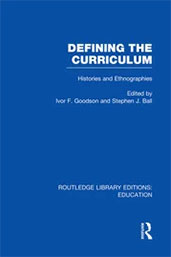Defining the Curriculum: histories and ethnographies
Subjects for Study: towards a social history of curriculum
School Subjects and Curriculum Change: An Explanatory Framework
The Structure of Material Interests: Status, Resources and Careers
The historical investigation of the curriculum conflict over 'environmental studies' suggests the pursuit of material interests as a major explanatory factor in understanding curriculum change. This is not to provide an overarching theory but to suggest that this aspect has been substantially neglected in previous accounts.
The similar aspirational patterns discerned in the subject histories provided direct our attention to the structuring of material interests – how resources and career chances are distributed and status attributed.
Essentially the structure emerged in the period 1904-17. The 1904 Regulations defined the subjects suitable for the secondary grammar schools. These were largely academic subjects and they were subsequently enshrined in the School Certificate examinations launched in 1917. From then on these examination subjects inherited the priority treatment on finance and resources directed at the grammar schools (Smith, 1980, pp. 153-6).
The structure has effectively survived the ensuing changes in the educational system (although it is now becoming subject to major challenges). Byrne, for instance, states 'that more resources are given to able students and hence to academic subjects' (the two are still synonymous) since 'it has been assumed that they necessarily need more staff, more highly paid staff and more money for equipment and books' (Byrne, 1974, p. 29).
The material interests of teachers - their pay, promotion and conditions - are broadly interlinked with the fate of their specialist subject communities. The 'academic' subject is placed at the top of the hierarchy of subjects because resource allocation takes place on the basis of assumptions that such subjects are best suited for the able students who, it is further assumed, should receive favourable treatment.
Hence in secondary schools the self interest of subject teachers is closely connected with the status of the subject in terms of its examinable knowledge. Academic subjects provide the teacher with a career structure characterized by better promotion prospects and pay than less academic subjects. From this viewpoint the conflict over the status of examinable knowledge is therefore essentially a battle over the material resources and career prospects available to each subject community.
